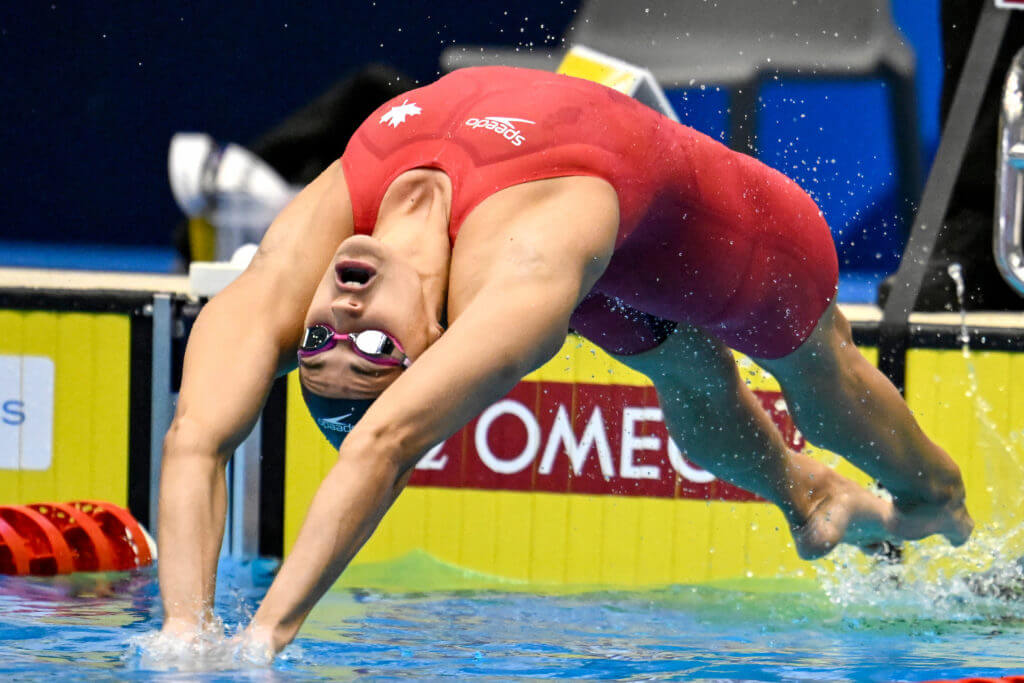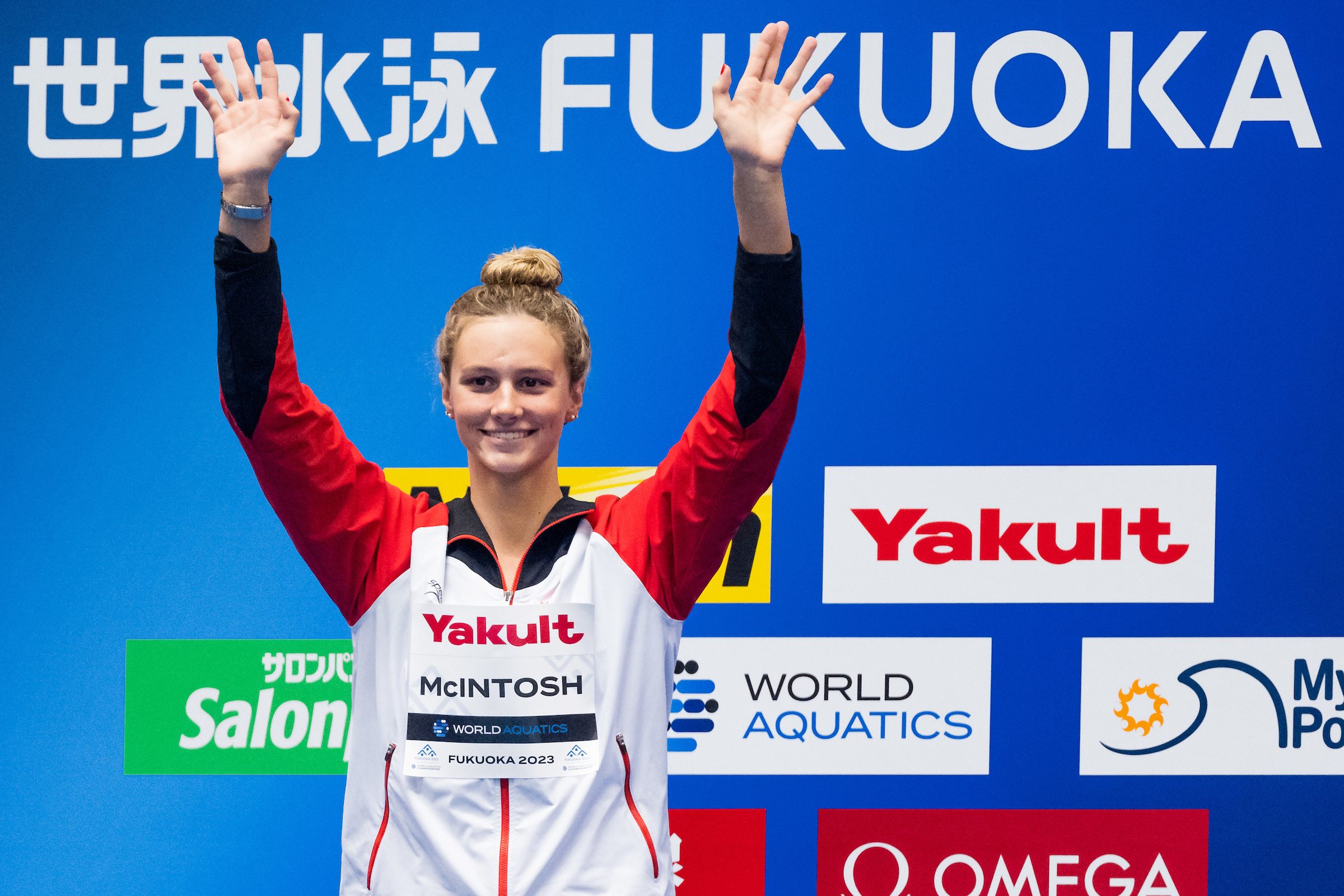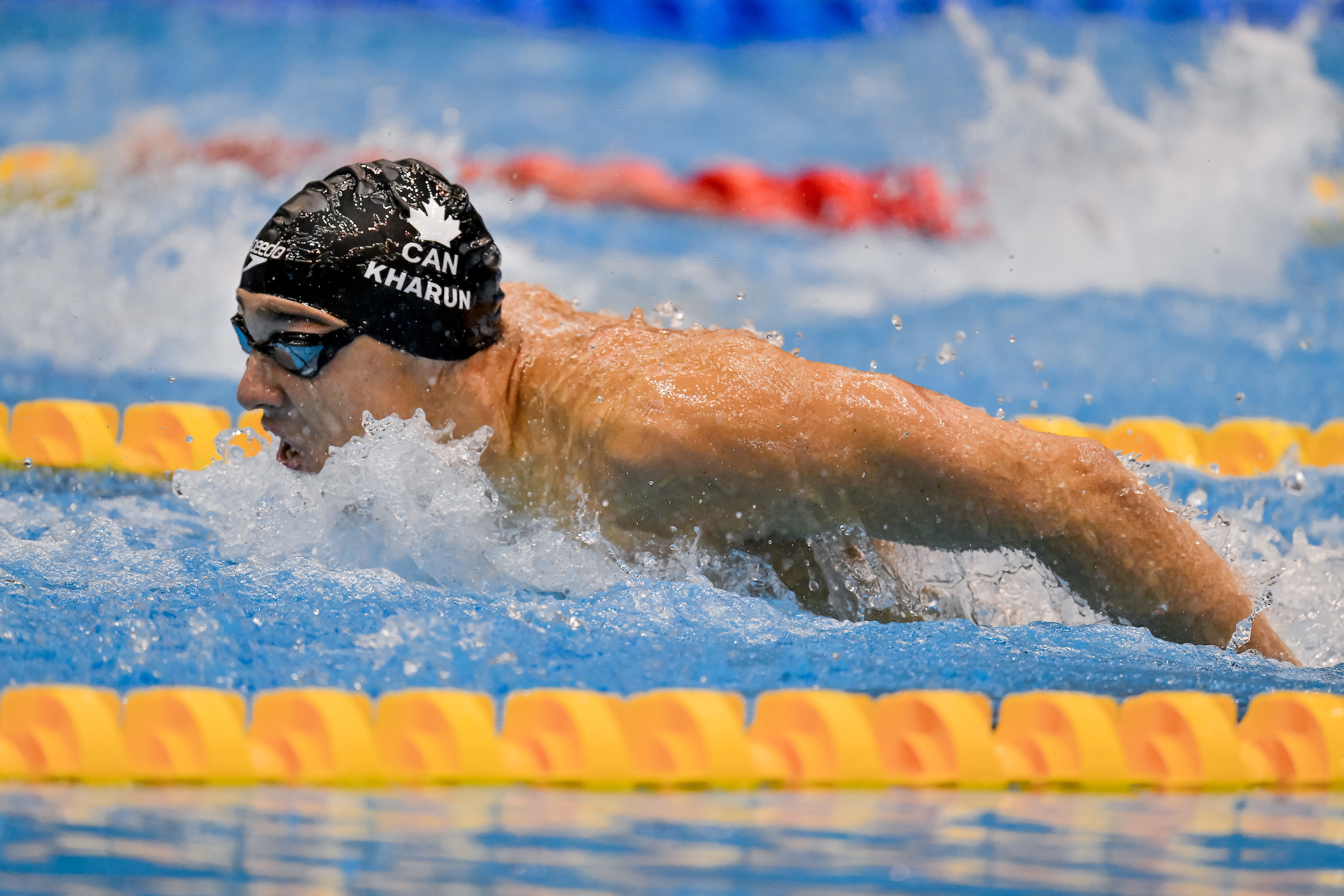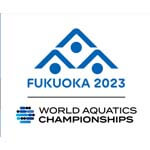Even with Absences, Canada Hit 6-Medal Benchmark at Worlds

Editorial content for the 2023 World Aquatics Championships is sponsored by FINIS, a longtime partner of Swimming World and leading innovator of suits, goggles and equipment.

Even with Absences, Canada Hits 6-Medal Benchmark at Worlds
Every appraisal of Canada’s performance at the World Aquatics Championships last month came with a caveat. However promising the building blocks on display in Fukuoka, the understanding for the country, more than most in attendance, was of how incomplete the roster was.
So entering the final day with four medals on the ledger, two of them from Summer McIntosh, didn’t constitute a great shortfall. Nor did the last-night performance of a bronze medal and all-important relay qualification in the women’s 400 medley, need to be a week-saving session.
When all was said and done at the Marine Messe Hall, Canada emerged with six total medals – the same tally it had reaped from the Tokyo Olympics and from Rio seven years ago. Though well shy of the 11 from Budapest last year, it indicates a program building toward the next Olympics. It achieved that on the back of McIntosh’s rising star, but without some of the relay cogs that should make it a contender when Paris rolls around.
“We want to build momentum,” said Josh Liendo, who earned the only men’s medal with silver in the 100 butterfly in a Canadian record 50.34 seconds. “Obviously we have people that are missing and decided to get themselves ready for next year so that we have our strongest team and make sure they’re all healthy and ready to go for next year. So I think it’s a perfect time for people to step up and get the momentum going for some of the younger swimmers to do better.”
The Summer of Summer
McIntosh is the unquestioned headliner and standard-bearer for the program. She was disappointed not to have earned a medal from her first swim, finishing fourth in the 400 free and seeing Ariarne Titmus reclaim her world record in the process. But the 16-year-old rebounded spectacularly.

Summer McIntosh of Canada; Photo Courtesy: Andrea Masini / Deepbluemedia / Insidefoto
She battled for bronze in the 200 free, against a tremendously deep field, to win bronze in a best time, lowering her national and world junior marks to 1:53.65. She bossed the 200 fly to win in 2:04.06, lowering those same standards and adding an Americas’ record. And she started the final day’s swimming with an authoritative performance in the 400 individual medley, a competition record of 4:27.11 to win gold by more than four seconds.
“It was definitely motivating,” McIntosh said of the 400 free. “I try to turn everything that goes wrong into motivation somehow. I try to look at all the positives because I still learned so much from that race, and the positive of that I had so many other races to go so chances to continues to get better.”
“I think firstly, from a 16-year-old, it’s a fabulous week,” Swimming Canada High Performance Director John Atkinson said. “Great character, and obviously in the 400 on the first day, it wasn’t where she wanted it to be or where her coach wanted it to be. But she worked tremendously well the next couple of days to get ready for the 200 freestyle, winning a bronze medal in a world junior record. …
“You can’t ask more from that. She’s very driven, knows what she’s doing, well-coached, and I just say, well done, keep doing what you’re doing.”
Beyond McIntosh, though, the big names on the women’s side endured a rough meet. Kylie Masse, who’d won an individual gold medal at each of the last three Worlds, was shunted off the podium in all three distances in the face of Kaylee McKeown’s historic treble. Masse was fourth in the 50 and 100 (with Ingrid Wilm fifth in the latter) and fifth in the 200.
Maggie MacNeil won silver in her signature 100 fly behind China’s Zhang Yufei. But she had a light workload individually that included not making it out of prelims in the 50 fly.
All that came with Taylor Ruck limited to three relay legs, coming off a broken hand, though the reigning NCAA champ in the 200 free didn’t end up on either prelims or finals for an 800 free relay in which Canada struggled to string together three non-McIntoshes who could break two minutes. It came with Penny Oleksiak home rehabbing her knee and other injuries. And it came with the still open question of who replaces Kayla Sanchez on relays after her defection to the Philippines.
“I think every year, different things are going on and we have to just look at who’s here and our performances here and the next step in the future when that comes,” Masse said. “Whether that’s with the same people or different people, who knows. But we’ll cross that bridge when we get there.”
Two shining swims
The general struggles made two performances all the more salient. First was Ilya Kharun, who continues to be a revelation. The Las Vegas born and bred butterflier has sent the national record in the 200 fly plummeting since his arrival, from 1:56.27 in the hands of Mackenzie Darragh to Kharun’s Fukuoka finals swim of 1:53.82, which tied Thomas Heilman of the U.S. for fourth. Kharun was eighth at 150 meters before charging home in 29.15, the fastest of the final.

Ilya Kharun of Canada; Photo Courtesy: Giorgio Scala / Deepbluemedia / Insidefoto
Kharun also finished ninth in the 100 fly in 51.22 and 13th in the 50 fly, twice tying Liendo’s national record. He helps solidify the back end of the Canadian medley relays, though a strong meet from Ruslan Gaziev means his spot isn’t in that much danger (though Kharun in fly, Liendo in free is an option). Kharun is going from training strength to training strength next year when the Sandpiper of Nevada enrolls at Arizona State.
“He’s been phenomenal,” Atkinson said. “He’s 18, was well-coached in Vegas with Ron Aitken and now moving down with Bob Bowman. He’s got things he can work on, he knows what he needs to work on, but fourth place in the 200 fly at his first Long Course World Championships with I think the fastest back 50 shows what he’s going to be capable of doing.”
The Canadian men finished seventh in the medley relay and fifth in the 400 free, results that if replicated in Doha at the next Worlds will easily get them to Paris.
The cherry on top came in the women’s medley relay on Sunday, with Masse, Sophie Angus, MacNeil and McIntosh going 3:54.12 to edge China by .45 seconds to the podium … and more importantly, the automatic berth in Paris next year. Angus delivered a great swim in the leg that is the question mark (and really, was for every team, with Agnus as the fourth-fastest of the final), and McIntosh stepping in to bring it home in a role that has long been reserved for Oleksiak.
Atkinson demurred on whether that’s a role for McIntosh in the future – “It fits in with the program and where everything’s at” in Fukuoka, he said. But ensuring their Paris spot was an important coda on the week, both logistically and emotionally in the momentum Canada looks to carry into 2024.
“It’s been a challenging meet, and always coming in on the last day with a relay is tough,” Masse said. “But I wanted to do it for the girls. Clinching a shot for Paris 2024 was the goal for this meet, and to be able to accomplish that is a really great motivator. I think we’re all looking forward to next year.”


- MEET HOMEPAGE
- COMPETITION SCHEDULE
- ENTRY LISTS
- 2022 WORLD CHAMPIONSHIPS
- LIVE RESULTS
- DAY 1 PRELIMS RESULTS
- DAY 1 FINALS RESULTS
- DAY 2 PRELIMS RESULTS
- DAY 2 FINALS RESULTS
- DAY 3 PRELIMS RESULTS
- DAY 3 FINALS RESULTS
- DAY 4 PRELIMS RESULTS
- DAY 4 FINALS RESULTS
- DAY 5 PRELIMS RESULTS
- DAY 5 FINALS RESULTS
- DAY 6 PRELIMS RESULTS
- DAY 6 FINALS RESULTS
- DAY 7 PRELIMS RESULTS
- DAY 7 FINALS RESULTS
- DAY 8 PRELIMS RESULTS
- DAY 8 FINALS RESULTS



